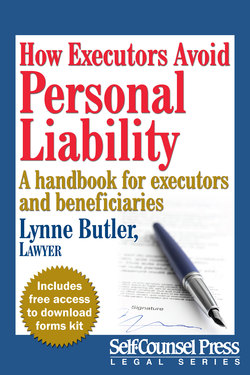Читать книгу How Executors Avoid Personal Liability - Lynne Butler - Страница 10
На сайте Литреса книга снята с продажи.
6. Specific Language in a Will
ОглавлениеIt is important to realize that the powers and limitations of an executor as described in the previous sections of this chapter exist, but may be changed or augmented by specific language used in a will. The general rule is that the existing law is used as the default position unless it is varied by the will itself.
Not every wish or instruction given by a testator in a will is legal or binding. Sometimes testators will include clauses that simply cannot be followed, such as a man leaving a gift to his daughter only if she divorces her husband, or one that requires someone to repay an inheritance to the estate if he picks up the habit of smoking. If the will you are administering contains any unusual clauses like these, you should take the will to a lawyer for a discussion of how to handle the instructions.
However, most instructions left in a will that are intended to override the usual way of doing things are valid and should be followed. A few examples of clauses that validly direct the executor to manage things in a way that is outside the usual are:
• Directing that the beneficiary who inherits an asset pays the tax on that asset. Normally the taxes are paid by the general estate, regardless of who receives the taxable asset. This means that in the absence of any specific instructions, one person might inherit the deceased’s cabin, while all beneficiaries have to bear the tax burden from the cabin. Sometimes testators who are aware of the way tax rules work will include a clause in the will directing that the beneficiary who gets the cabin (or business, land, or other taxable asset) will pay the taxes. As an executor, it is essential that you understand the source of tax payments, so pay close attention to any instructions in the will that reference payment of taxes.
• Directing that the share of someone who predeceases the testator is not to be shared among the deceased’s children. We are used to seeing wills that say the inheritance of a person who has died should be paid to that person’s children instead. In fact, this concept is the basis for intestacy law in most of Canada. However, if the will says that the inheritance is not to be divided among that person’s children but is to go somewhere else instead, those instructions are valid.
• Directing that the entire estate be liquidated and the money divided. These days it is rare to see an estate that is completely sold off. However, if a testator wants that to happen with his or her estate, and sets out these instructions in a valid will, you are obligated to follow it.
